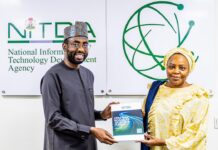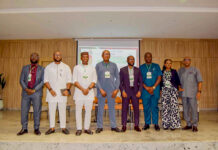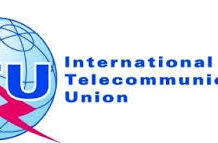Zainab Ahmed, Hameed Ali: How Newsmakers Stunned Newsbreakers With New IDEC Digital Technology
By Mohammad Dahiru Lawal
TECH DIGEST – Perhaps, the most stunning thing about Digital Technology, especially Digital Media, is not only the uses and gratification derived from it’s utilization, but the accelerated pace at which it is becoming an embedded aspact of our daily lives.
With Digital Media Technology focusing on enabling technologies for Digital Media systems, including technologies for analysing media, generating interactive media, processing and coding, including optimizing inputs for desired output, the submission of renowned Canadian Philosoper and Media Theorist, Marshall McLuhan which posits Media as an extension of man as reflected in his popular coinage, “the medium is the message,” is fast becoming a premium reality.
So, when the Federal Ministry of Finance, Budget and National Planning in collaboration with the Nigerian Customs Service (NCS) gathered it’s officers and men alongside gentlemen of the press, Nigerian Millitary, Manufacturers Association of Nigeria ( MAN), and other critical stakeholders in Nigeria’s economic growth at the Auditorium of Customs Training College Kano for a one-day sensitization seminar on the “Automated Import Duty Exemption Certificate (IDEC) Processing and Approval,” it was obvious that a new automated platform was about to be unveiled, but what was not obvious however was the wholistic and transparent nature of the Technology particularly coming from government arms that are not insulated from suspicion in financial dealings.
The platform which is simply accessible at www.idec.gov.ng or www.idec.ng was designed to eliminate the challenges associated with applying for an IDEC which usually takes between 30 – 60 days but is now obtainable within just three days. It has a solid electronic document management system that manages all documents verifications, thereby reducing the processing time to obtaining an IDEC approval.
The most fascinating part of it all for me when a demo of the procedure for application was displayed was the totally transparent nature of the platform which is guaranteed to not only block leakages with it’s attendant positive effects, but also promote trade efficiency, boost investors confidence, transparency and ease of doing business.
This development not only marks another dawn with using the Internet of Things (IoT) in driving Nigeria’s economic growth, but also speaks to the visionary vision of the duo of Nigeria’s Minister of Finance Budget and National Planning, Mrs. Zainab Ahmed and Comptoller General of Customs, Col. Hameed Ibrahim Ali rtd, in leveraging on the Federal Government’s interest in promoting and sustaining transparency and efficiency in delivering services in the public sector domain and organized private sector by subjecting their portfolios towards making digital transformation a national priority.
Though both ably represented by the Honourable Commissioner of Finance and Economic Development, Kano State, Honourable Shehu Na’Allah Kura and Commandant of Customs Training College Kano, Comptoller, Lawrence Banye respectively, the Minister of Finance Budget and National Planning, Mrs Zainab Ahmed and the Comptroller General of Customs, Col. Hameed Ibrahim Ali rtd, have proved thier mettle as digitally inclined reformers, especially in using the rapidly evolving IoT to conduct Government business for the purpose of efficiency and transparency.
When In 1999, Kevin Ashton coined the term “the Internet of Things” not many paid heed until it gained momentum in 2011, after a Gartner report added it to the list of new emerging technologies.
Since then, IoT gained global coverage, as more companies worked on advancing and applying it
In the past, people referred to IoT as “embedded internet.” Today, IoT as a technology that enables users, systems, and devices, to connect to a wide range of networks, thus expanding the connectivity between the physical and the digital, is embedded in many aspects of our lives and as more organizations and governments make digital transformation a priority, the adoption of IoT technology increases.
In 2018; there were 7 billion IoT devices in the world, In 2019; there were 26.66 billion active IoT devices, in 2020; experts estimate the installation of 31 billion IoT devices worldwide. With IoT being connected to the world wide web every 127 seconds, by 2021 35 billion devices would have been installed worldwide with numbers estimated to reach 75 billion by 2025.
That Messrs Ali and Zainab understand this trend and it’s great potentialities, is not only stunning but also serves as a charge on Journalists to not only flaunt their pen towards breaking the great news but to also advocate for it’s concerted adoption by target beneficiaries.
One of the beneficiaries present, Alhaji Ibrahim Shehu, the North West Zonal Coordinator, Nigerian Agricultural Quarantine Service expressed satisfaction, stating the the platform is coming up at the right time.
“I am highly impressed, the essence of the IDEC is to industrialise the nation. Thereby reducing unemployment. If there are exemption for importion of materials and equipments, a lot of industries will be able to set up thereby employing the unemployed which reduces unemployment and by implication the criminal activities that we have been experiencing due to lack of job for our youths in the country.”
Sunusi Wakili a Customs broker described the Technology as a fantastic one which has removed the dichotomy between prospective importers, IDEC beneficiaries and the conflict between Customs and importers especially on the issue of value of import or name applicable on IDEC and what is applicable on the import document.
“This is clearly new generation which will cripple any corruption and honestly, IDEC online has done away with the corrupt tendencies of some Nigerians who think we know man to man and go and negotiate IDEC for IDEC” he said.
The Commandant of CTC Kano while speaking on behalf of the Comptroller General, confirmed that the Minister of Finance have authorised the discharge of the platform in Kano, Lagos and PortHarcourt.
With the adoption of such platforms which reduces human interferences in highly sensitive transactions like the IDEC, it goes without saying that a new era for transparency in the conduct of government businesses have arrived and the pacesetters are obvious.
Mohammad Dahiru Lawal, a development Journalist, writes from PRNigeria Centre Kano via [email protected]
















